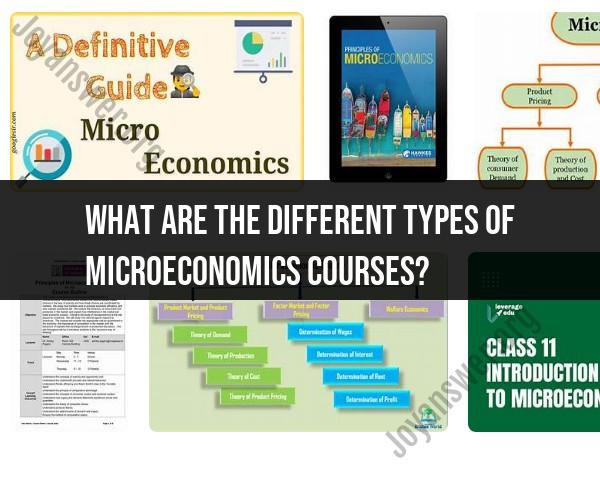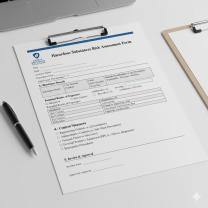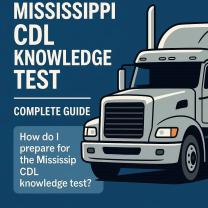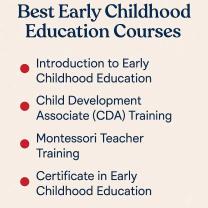What are the different types of microeconomics courses?
Microeconomics courses cover various aspects of individual economic units, focusing on the behavior of households, firms, and markets within an economy. Here are some different types of microeconomics courses:
Introductory Microeconomics: These courses offer a broad overview of microeconomic principles, including supply and demand, consumer behavior, production theory, market structures (perfect competition, monopoly, oligopoly), and basic economic analysis.
Intermediate Microeconomics: These courses delve deeper into microeconomic theories and concepts. Topics may include utility theory, cost functions, market equilibrium, game theory, externalities, public goods, and welfare economics.
Advanced Topics in Microeconomics: Specialized courses that explore specific areas within microeconomics, such as:
Labor Economics: Focuses on the labor market, wages, employment, human capital, and factors affecting labor supply and demand.
Industrial Organization: Analyzes market structures, competition, pricing strategies, and firm behavior within industries.
Health Economics: Studies the economics of healthcare systems, healthcare policies, healthcare markets, and healthcare-related decision-making.
Environmental Economics: Examines the economic impacts of environmental policies, sustainability, pollution, and natural resource management.
Development Economics: Explores economic development, poverty, inequality, and policies aimed at improving living standards in developing countries.
Behavioral Economics: Focuses on the psychological and behavioral factors influencing economic decisions, studying biases, decision-making processes, and deviations from rationality.
Experimental Economics: Involves conducting experiments to study economic behavior, testing theories and hypotheses in controlled settings.
Microeconomic Policy Analysis: Applies microeconomic principles to analyze and evaluate policies related to taxation, regulation, trade, and market interventions.
Applied Microeconomics: Courses that apply microeconomic theories and models to real-world scenarios, industries, or case studies, providing practical insights into economic analysis and decision-making.
Microeconomics courses vary in depth and focus, catering to different levels of students—ranging from introductory courses for beginners to specialized and advanced topics for those pursuing in-depth knowledge or research in specific areas of microeconomics.
What are the distinctive focuses or variations among different microeconomics courses?
The variations in focus and content among different microeconomics courses can be quite diverse, depending on several factors:
Level of study:
- Introductory courses: Usually emphasize foundational concepts like supply and demand, market equilibrium, consumer theory, and producer theory. These courses provide a broad overview of microeconomic principles.
- Intermediate courses: Delve deeper into specific areas like market failures, game theory, industrial organization, information economics, and behavioral economics. They analyze specific market imperfections and explore strategic interactions between firms and individuals.
- Advanced courses: Focus on cutting-edge research and specialized topics like auctions, mechanism design, economic dynamics, econometrics, and experimental economics. These courses require a strong foundation in core microeconomic principles and often involve independent research projects.
Area of application:
- General microeconomics: Focuses on the universal principles governing individual decision-making, resource allocation, and market interactions.
- Applied microeconomics: Examines how microeconomic principles apply to specific real-world issues like health care, education, environmental policy, labor markets, and international trade. These courses often integrate empirical data and quantitative analysis.
Methodological approach:
- Theory-based courses: Primarily emphasize theoretical models and mathematical analysis to explain and predict economic behavior.
- Empirically-oriented courses: Incorporate real-world data and statistical analysis to test economic theories and evaluate policy implications.
- Experimental microeconomics: Utilize controlled experiments to study individual decision-making and market behavior in a laboratory setting.
Additional variations:
- Some courses might focus on specific regions or sectors of the economy, like developing countries or financial markets.
- The instructor's expertise and interests can influence the course content, highlighting specific research areas or theoretical approaches.
- Online or blended learning formats might offer different delivery methods and resources compared to traditional classroom settings.
To choose the right microeconomics course for you, consider your level of study, your specific interests, and your career aspirations. Talk to professors and advisors to understand the unique focus and approach of different courses within your program. Remember, microeconomics is a dynamic field, and continuously seeking new knowledge and exploring diverse perspectives is key to gaining a deeper understanding of how individuals and markets interact in the real world.
I hope this explanation helps you navigate the variety of microeconomics courses available and find the one that best suits your needs and goals! Feel free to ask any further questions you might have about specific course approaches or areas of focus within microeconomics.













